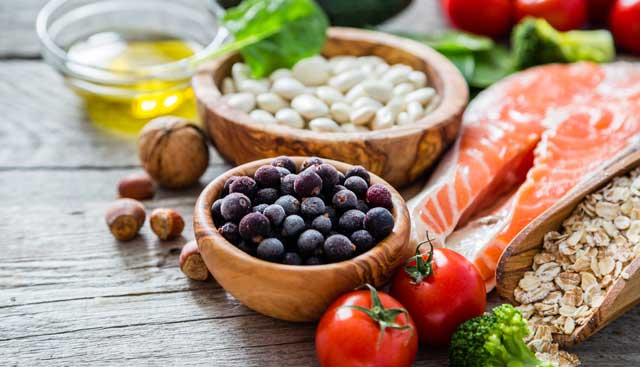
Five Questions With: Dr. Amber Orman on Nutrition and Clean Eating
Radiation oncologist Dr. Amber Orman’s clinical focus is breast cancer with an emphasis on holistic care that encompasses both mind and body. She coaches patients on nutrition and lifestyle changes that lead to healing and better overall health. We sat down with Dr. Orman to get her take on nutrition, diet and if she has any food weaknesses.
1. Why is it important to you to not only treat a patient’s
cancer but also the patient as a whole? What benefits from your integrated practices are you seeing from patients after their treatment is over? Addressing other aspects of what I consider basic patient care, including nutrition, physical exercise, sleep quality, and stress reduction, helps each patient feel more in control and capable of undergoing more “traditional” cancer treatments. It also establishes healthy habits that have long-term benefits such as reducing the risk of or improving most chronic diseases (think diabetes, cardiovascular disease, etc.) as well as reducing the risk of cancer recurrence. I tell my patients the following: “This is your piece of the treatment. Your physicians operate and prescribe chemotherapy and radiation, but this is your piece.”
In patients who have made positive lifestyle changes, I have seen decreased skin redness from radiation; increased energy; improvements or resolution in depression and anxiety; weight loss; and decreases in blood pressure, blood sugar, and cholesterol, resulting in discontinuation of medications for hypertension, diabetes, and high cholesterol by their primary care physicians.
2. Your motto is: “Eat more plants!” How does eating more plants contribute to better health and disease prevention?
The benefits of a plant-based diet are far-reaching and data-driven. All major medical guidelines recommend a plant-based diet. I follow a plant-based diet myself, and I have personally seen many benefits. I begin with this recommendation because it is applicable to all people – regardless of their current lifestyle. We can all stand to eat more plants.
3. The summer months can be brutally hot, what are some foods that can keep you hydrated?
The majority of our hydration comes from water in some form, however roughly 20 percent of our daily water intake comes from foods. I encourage patients to make their own fruit infused waters, and to always have a bottle of water around. Fruits and vegetables are incredibly hydrating and full of beneficial phytochemicals. Some of the most hydrating foods include (approximate percentages of water): cucumbers (97%), greens (94%), zucchini (95%), cantaloupe (90%), watermelon (92%), bell peppers (92%), pears (84%), eggplant (93%), pineapple (87%), carrots (87%), mangoes (82%), apples (85%), grapefruit (91%), strawberries (92%), oranges (85%), broccoli (91%), raspberries (85%), celery (96%), blueberries (85%), grapes (81%), tomatoes (95%), kiwi (83%), radishes (95%), cauliflower (92%), star fruit (92%), cherries (81%).
4. What’s your favorite food? What are you implementing in your daily diet? What food is your weakness?
I crave variety, so it’s hard to settle for one “favorite” food. For breakfast though, I often make “oatcakes” which are basically oatmeal made into pancakes, with hemp and chia seeds for extra protein. I eat these with raw organic almond butter, Himalayan sea salt, and local honey on top, alongside a large serving of berries (usually blueberries, raspberries, and/or strawberries), and hot matcha green tea. This gives me around 25 grams of protein, along with carbohydrates and a little caffeine to fuel my morning one-hour workout.
I always have a post-workout protein smoothie with almond milk, protein powder of some sort or plain hemp protein, frozen cherries, spinach, cacao nibs, and cinnamon.
Lunch usually consists of quinoa or brown rice with some sort of vegetable/bean curry or dal. I also make a lot of salads with various toppings (fresh veggies, seeds, nuts, dried and fresh fruits, beans, roasted tofu, olive oil and fresh lemon juice or vinegar). I try to get a decent amount of protein and veggies in at every meal.
Dinner is often a salad with tons of toppings including some sort of protein. I also love gluten free bread topped with smashed avocado, salt, sprouts, cucumbers, tomatoes, and greens. I usually have fruit and dark chocolate for dessert.
I have frequent snacks including fruits (berries are my favorite), hummus and carrots or organic black bean chips, raw nuts (I love macadamia nuts and almonds), homemade protein bars, etc.
My diet is entirely plant based, and also gluten free. I’ve transitioned to this over a period of years, and love the foods I eat and the way I feel. I am very fortunate in that I actually enjoy what I eat, and don’t feel deprived. I see food as fuel and want to put the best possible things into my body. I am also a huge foodie, so everything I eat is fabulously delicious.
5. What are some common diet-struggles that cancer patients have?
Food is our biggest addiction. People commonly see food as an antidepressant, a cure for anxiety, or some type of reward. I help people rethink their approach to food. Food is the fuel required for your body to run, and you decide if you’re putting in premium. Once a patient understands this, changing their nutritional intake becomes much easier. I provide resources for recipes, give out my own recipes, and suggest brands of specific foods (such as nut-based cheeses and yogurts in those avoiding dairy). I provide my personal contact information for questions that arise, and continue coaching them during and after treatment.
Five Questions With is an occasional series featuring Moffitt team members, patients and volunteers.
